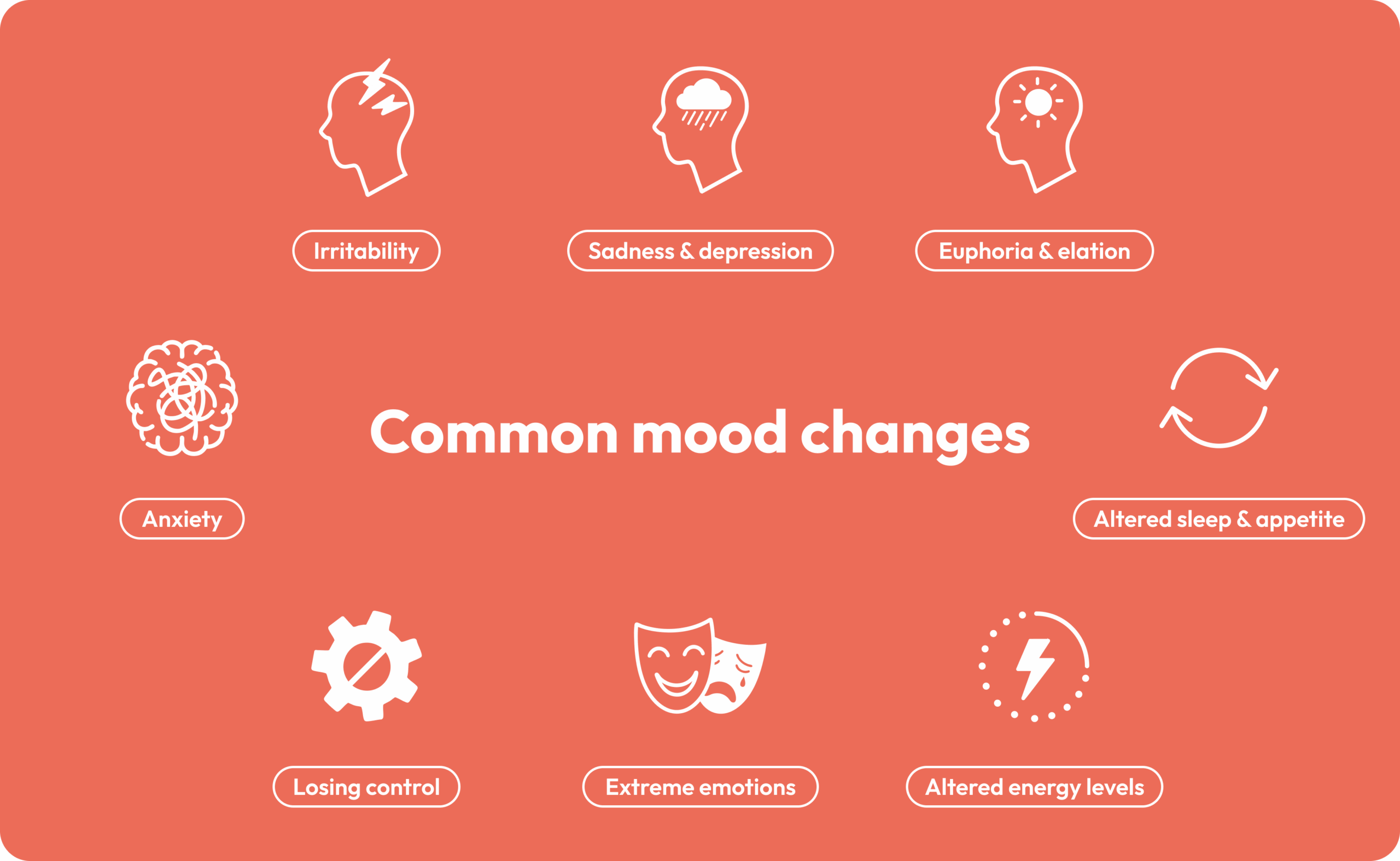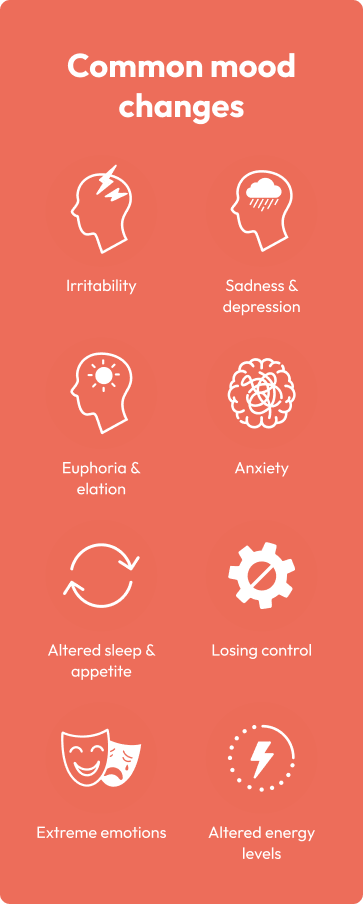Mood swings: Causes, symptoms, & treatments
Maybe you’ve noticed your emotions feel less predictable than they used to. One day you’re patient and steady; the next, you’re irritable, anxious, or teary for no clear reason. Things that never used to bother you now seem to hit harder. You might assume it’s stress, a busy schedule, or lack of sleep, but deep down, you sense something has shifted.
What you’re feeling may not just be stress or getting older. For many women, these kinds of emotional changes are among the first signs of perimenopause. Even if your periods are still coming regularly, your estrogen and progesterone may already be rising and falling in new patterns that subtly, and sometimes not so subtly, affect how you feel.
What’s relieving is that these mood changes are not permanent, and you don’t have to just push through. Once you understand what’s happening, you can then understand how to restore balance, whether through lifestyle changes, hormone therapy, or simple adjustments that help your body and mind.
If you’ve been feeling unlike yourself lately, this could be your body’s way of saying: It’s time to pay attention. And chances are, it’s perimenopause.
What causes mood swings?
The emotional ups and downs you feel aren’t all in your head. No. They’re in your hormones. Estrogen and progesterone, the two main reproductive hormones, don’t just control your menstrual cycle. They also help regulate brain chemicals like serotonin, dopamine, and norepinephrine, which influence your mood, sleep, and sense of well-being.
During perimenopause and menopause, levels of estrogen and progesterone rise and fall unpredictably. When these hormones fluctuate, so can how you feel.
Other factors can make mood swings worse:
- Poor sleep from night sweats or insomnia
- Stress at work or home
- Physical changes like weight gain or fatigue
- Life transitions such as caring for parents, kids leaving home, or tragedy
Hormonal shifts may start up to 10 years before menopause (average age 51). That means emotional changes can appear well before your final period.
Mood changes you may be experiencing
One of the challenging aspects of perimenopause and menopause is realizing your emotions don’t feel like they used to. You might go from calm to overwhelmed in a matter of minutes or find yourself crying because of a clip you watched on your phone, only to then feel irritable. These changes can leave you wondering what’s happening and why you suddenly feel “off.”
You may notice:
- Irritability or anger: feeling short-tempered or snapping more easily than usual
- Anxiety or restlessness: worrying more often, even about small things
- Sadness or low mood: moments that feel like mild depression or a loss of joy
- Tearfulness: crying more easily or feeling emotionally raw
- Mood swings: quick shifts from happy to irritable or from calm to upset
- Decreased motivation or focus: trouble concentrating or feeling less productive


Sometimes, these mood changes show up alongside physical symptoms like hot flashes, night sweats, poor sleep, fatigue, and weight gain, which can make them feel even more intense. It can be an unfortunate cycle where the less you sleep, the more emotional you may feel, and the harder it can be to rest.
But know that this is not the end-all be-all. You have options that can help you manage these mood swings and other disruptive hormonal symptoms.
Managing mood swings during perimenopause and menopause
While mood swings during perimenopause and menopause are common, there are ways to find relief from the disruptive symptoms. Relief often comes from a mix of medical treatment, lifestyle changes, and emotional support, all specific to you and your needs. Doctors will look at your health history, family medical history, your symptoms, etc., to help determine what can help you. Let’s take a look at some options:
Menopause hormone therapy (MHT)
Menopause hormone therapy, sometimes called hormone replacement therapy (HRT), is one of the most effective ways to stabilize mood swings linked to hormonal changes. By replenishing estrogen (and adding progesterone if you still have your uterus), MHT helps smooth out the hormonal fluctuations that can trigger anxiety, irritability, and emotional highs and lows.
Research shows that estrogen therapy can improve mood, energy, and even sleep for many women, among other symptoms, going through the menopause transition. For those who also experience hot flashes or night sweats, it often brings more control so that you can feel a bit steadier both physically and emotionally.
Counseling and emotional support
Sometimes, talking helps as much as treatment. Counseling or cognitive behavioral therapy (CBT) can teach techniques and strategies to manage irritability, low mood, and stress. It’s especially helpful if mood swings are affecting your work, sleep, relationships, or just your day-to-day. Even a few sessions can help you understand what’s within your control and how to respond to what isn’t.
Support groups and online communities can also remind you that you’re not alone. Many women are navigating the same transition, and it helps to just talk it out with someone who understands the moodiness and everything else you may be feeling during perimenopause and menopause.
Natural remedies
Your daily habits are quite influential on how your body and mind respond to hormonal changes. While they can’t always replace medical treatment, they often make symptoms more manageable and improve overall well-being.
Meditation
Simple mindfulness practices can help calm your mind and reduce stress. Taking just a few minutes each day to breathe deeply, meditate, or focus on what you’re thankful for can help reset your nervous system. If you catch yourself in the moment feeling a certain way that you don’t love, stepping away for some fresh air can help. Over time, small habits like these can strengthen emotional stability and make it easier to manage sudden mood changes.
Exercise
Movement is one of the best natural mood stabilizers. Physical activity releases endorphins, which are the body’s “feel-good” chemicals, and helps regulate sleep and energy.
Dr. Sheryl Ross (Dr. Sherry), Chief Medical Officer of Women’s Health at QuickMD, notes, “Regular exercise improves your energy, mood, and emotional stability. Exercise makes you feel more confident and helps ease stress when dealing with menopausal symptoms.”
Even light activity, like walking, yoga, or swimming, can make a noticeable difference. Finding something you enjoy and doing it regularly will be the best thing you can do for yourself to stay active, not just for your overall well-being, but also while navigating mood changes and other disruptive hormonal symptoms.
Sleep
Quality sleep is important and arguably significant for emotional balance. Unfortunately, fluctuating hormones can make restful sleep harder to come by.
Dr. Sherry explains, “Getting adequate amounts of sleep restores the body and improves energy levels. Sleeping well improves mood, reduces mental stress, anxiety, depression, irritability, and brain fog.”
Creating a consistent bedtime routine, keeping your bedroom cool and quiet, and limiting screen time or caffeine before bed can all improve sleep quality. When your body gets the rest it needs, it can help your mood naturally become more stable.
Nonhormonal medications
If you prefer not to use hormone therapy or are unable to, nonhormonal medications could be an option. Certain antidepressants (such as SSRIs or SNRIs) can regulate mood swings and reduce other menopause symptoms like hot flashes. For some women, medications like gabapentin or clonidine may help when anxiety or sleep disturbances are more prominent.
Your QuickMD doctor can work with you to decide which treatment path feels safest and most effective for your situation. Your emotional health deserves the same care and attention as your physical well-being, and we’re here to support you and find a plan that works for you.
Feeling unlike yourself lately? See how hormone therapy can help bring balance.
Mood changes during perimenopause and menopause are common, but they don’t have to control your days. QuickMD doctors can help stabilize your hormones and your mood, so you can feel calm, centered, and more like you again.
We just launched our Menopause Hormone Therapy Membership in select states, and your first month’s on us. You’ll get to meet with a doctor, ask all your questions, and see if treatment might help.
If you love it and want to keep going, it’s /month after that, with special member pricing on medication and regular access to your doctor. And if you decide it’s not for you – that’s totally fine too. Get started by booking your free visit now.

